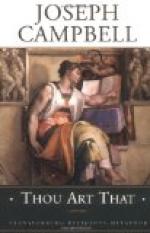|
This section contains 672 words (approx. 2 pages at 400 words per page) |

|
Chapter 3, Our Notions of God Summary and Analysis
The ultimate categories are being/non-being. God "means" nothing, because God is neither a fact nor a dream, but beyond conception. Westerners - and gods - must become "transparent to transcendence" when relating to the forms of everyday life. By saying, "I am God," Yahweh closes off this possibility for followers, for one is as one's god is. Religious metaphors must be understood by connotation, not denotation. The "End of the World" is a familiar theme in Judaism and Christianity, denoting a cosmic calamity, but in the Gnostic Gospel of Thomas, Jesus says that the Kingdom cannot be expected but spreads on earth unseen. Jesus identifies himself with God as a metaphor for what all people are, like the Eastern gurus. Meditating on denotation is worship, not mysticism. Jesus and Mary ascend to...
(read more from the Chapter 3, Our Notions of God Summary)
|
This section contains 672 words (approx. 2 pages at 400 words per page) |

|




